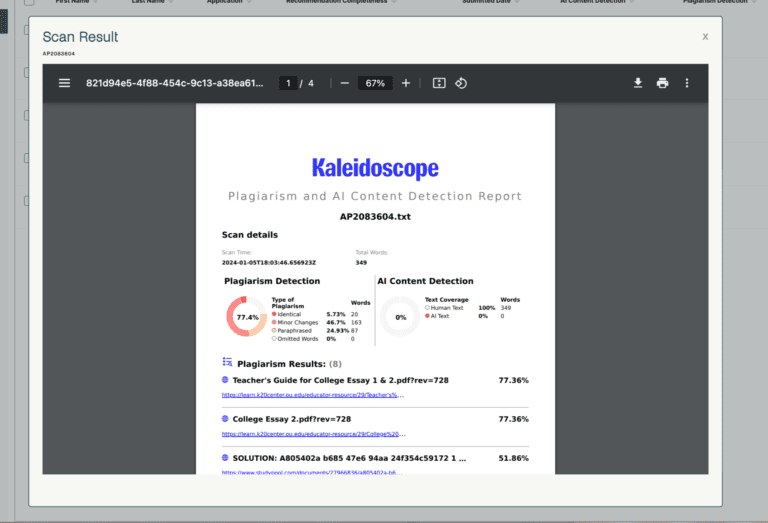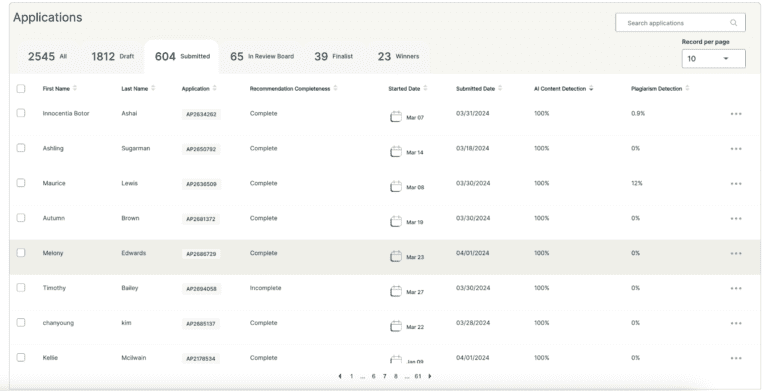Artificial intelligence is revolutionizing how we approach writing, learning, and education standards. It’s a huge buzzword across all industries and can be utilized for good and bad practices. For scholarship programs, where essays and long-text questions are critical in assessing applicants, AI usage can offer several key advantages for sponsors and organizations. We are here to help you navigate the pros and cons of using it in your scholarship process and the considerations to which limit you might allow applicants to utilize tools to help improve their writing.
Considering AI for Admin Use
Pros
Plagiarism Detection and Ensuring Originality
Scholarships can attract a large pool of applicants, and reviewing their essays for originality is crucial. AI-based plagiarism detection tools, such as Turnitin, Grammarly, and Kaleidoscope’s in-platform detection tool can help ensure that the content submitted by students is authentic. These tools compare a submitted essay against databases of published work, online articles, and previously submitted papers, flagging any sections that might be copied or paraphrased without proper attribution.
Detecting AI-Generated Essays
Detecting AI-generated content has become a new challenge for educators and scholarship evaluators, especially with the rise in popularity of text generators like ChatGPT. According to a survey of 1,148 class of 2024 college students performed by job search platform Handshake, “eighty-five percent of this year’s high school seniors have heard of tools like ChatGPT and DALL-E.” To combat this, many AI detection tools have been recently developed such as TraceGPT, WinstonAI, and Kaleidoscopes in-platform detection tool to flag AI-produced essays, helping ensure that applicants submit work that reflects their thoughts, knowledge, and effort.

Streamlining the Evaluation Process
For scholarship evaluators and review boards, AI tools can streamline the process of reviewing essays. Manually assessing hundreds or even thousands of essay submissions for originality is time-consuming. AI can automate this step, enabling faster, more consistent reviews. This would allow reviewers to focus on the content and ideas presented by the applicant’s essays rather than spending time on plagiarism checks.
Opportunity to Set Clear Guidelines on the Ethical Use of AI in Writing
With the increasing availability of AI writing tools, there is a growing number of ethical questions for scholarship programs. Scholarship providers can set clear guidelines regarding what constitutes acceptable use of AI in the essay-writing process. While AI can be a valuable tool for grammar and style improvements, scholarship essays should still reflect the applicant’s original thoughts and creativity. As AI tools become more pervasive, it’s essential to continue to educate applicants on ethical writing practices. AI detection tool’s usage promotes awareness and respect for these practices.
Cons
Bias and Fairness Issues
AI systems can unintentionally reinforce biases present in the data they are trained on. If historical data reflects biases, the model could perpetuate them, leading to unfair evaluations. For example, students from underrepresented backgrounds or schools that have been historically disadvantaged might not perform as well in traditional academic metrics, and an AI trained on such data might overlook them.
Lack of Human Judgment
The conclusions of AI lack empathy and intuition, which are often critical when reviewing applications. Personal stories, challenges overcome, or unique perspectives might not be fully understood or appreciated by an algorithm. Human evaluators can make nuanced decisions, weighing factors like passion, leadership potential, or personal struggles in ways that AI may not be able to replicate.

Over-Reliance on Automation
While AI can speed up the evaluation process, relying too much on automation may reduce the quality of the overall evaluation. Important human insights could be overlooked if AI becomes the primary decision-maker. This could also lead to a “checkbox mentality” where decisions are made based purely on whether certain criteria are met, without considering the bigger picture.
Our Recommendation
Only use AI to evaluate the originality of essays and check for plagiarism. Utilizing human reviewers will ensure that empathy and intuition are still present in the evaluations of your candidate’s personal stories. Consider utilizing a platform like Kaleidoscope, where AI and plagiarism detection are integrated into your program portal.
AI for Student Usage
Pros
Educational Value
AI-driven detection can serve as an educational tool, helping students learn how to write and improve original, well-referenced content. This helps foster personal growth and academic development. For example, tools such as Grammarly for Students and the Magic Tool student feedback tool have features to highlight areas where a citation is needed or even suggest ways to rephrase text to avoid accidental plagiarism. This feedback can help students develop better writing habits, which is especially valuable for scholarship applicants who may be early in their academic careers.
Builds Confidence in Writing
In return for the immediate feedback from AI tools, students can feel more confident in submitting their work when they’ve had a chance to review and revise using AI feedback, reducing the likelihood of grammar issues, unintentional plagiarism, improper citations, and unclear writing.

Opportunity to Guide Future Use
Scholarship providers can set clear guidelines on the acceptable level of AI assistance (e.g., for editing or grammar improvement) versus prohibiting full-text generation.
Cons
Reduced Quality of Candidates
With AI lifting the effort needed to apply for scholarships, providers may experience a surge in applicants who apply “just to get it done” or apply to as many scholarships as possible. This creates a pool of candidates that would need to be weeded out by reviewers for lack of merit or integrity.
Dishonest Behavior
Allowing students to use AI in scholarship essays raises ethical questions about academic integrity. Some professionals view it as a form of cheating or dishonesty, especially if AI tools generate substantial portions of the essay. If usage becomes widespread, it could begin to blur the line between authentic student work and assisted writing, creating a dilemma for scholarship committees about where to draw the line.
Reliance on AI Generation to Write Essays
AI-generated essays might lack the personal voice and genuine emotion that scholarship committees look for. Essays are meant to reflect a student’s unique experiences, character, and goals, which AI might not fully capture in its analysis. If it is evident, scholarship providers may question whether the essay represents the student’s true thoughts, leading to a disconnect between the applicant and the selection committee.
Loss of Creativity
AI tools often rely on patterns from a vast pool of existing content. This results in essays that feel formulaic or generic, which may reduce the chances of standing out in a competitive scholarship application process. Unique personal stories or creative approaches may become inauthentic due to AI-generated essays that follow predictable structures and themes.
Our Recommendation
Allow students to utilize AI with specific guidelines for what constitutes fair use. Set boundaries and enforce them with AI & plagiarism detection tools to ensure students are using it as a supporting tool and not a lifeline. Continue to encourage above and beyond creative behavior from your application to ensure the quality of your candidates will remain high and diverse.

Conclusion
AI is transforming how essays and long-text responses are evaluated in scholarship programs. From detecting plagiarism to identifying generated content, these tools can offer numerous benefits for both applicants and evaluators. AI tools help enhance fairness, support academic integrity, and streamline the evaluation process, ensuring that scholarship awards go to those who demonstrate genuine effort, creativity, and originality, but can also harm the integrity of a program’s candidates. As AI usage continues to grow, scholarship providers must strike a balance between leveraging tools to streamline their work and setting clear boundaries for acceptable use by applicants to maintain program integrity.











